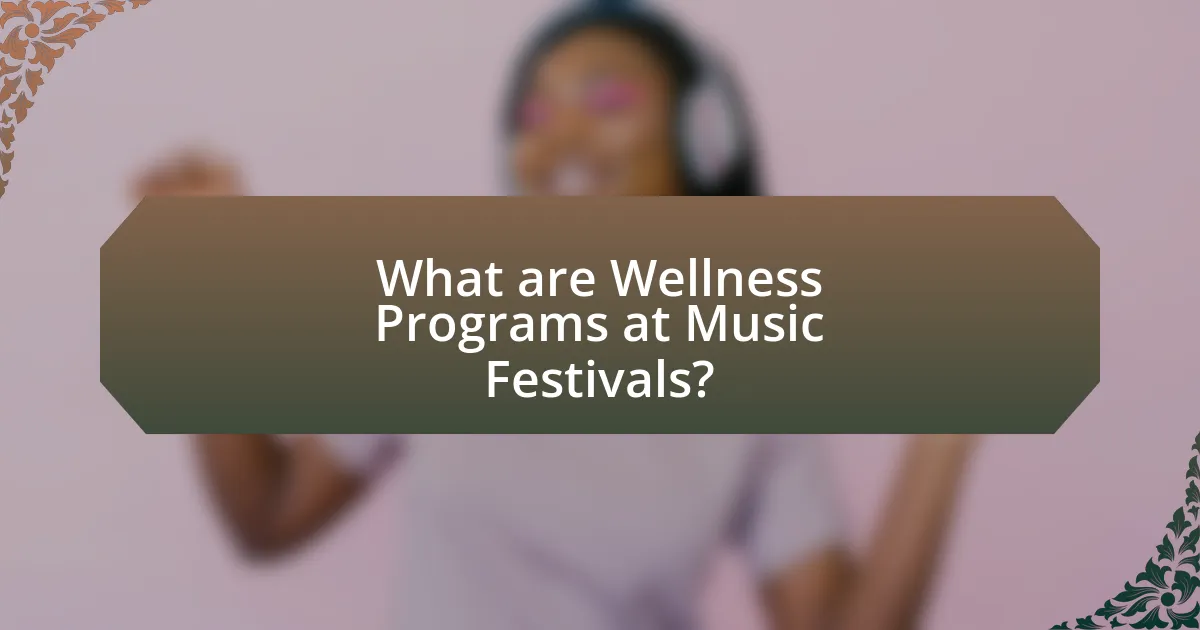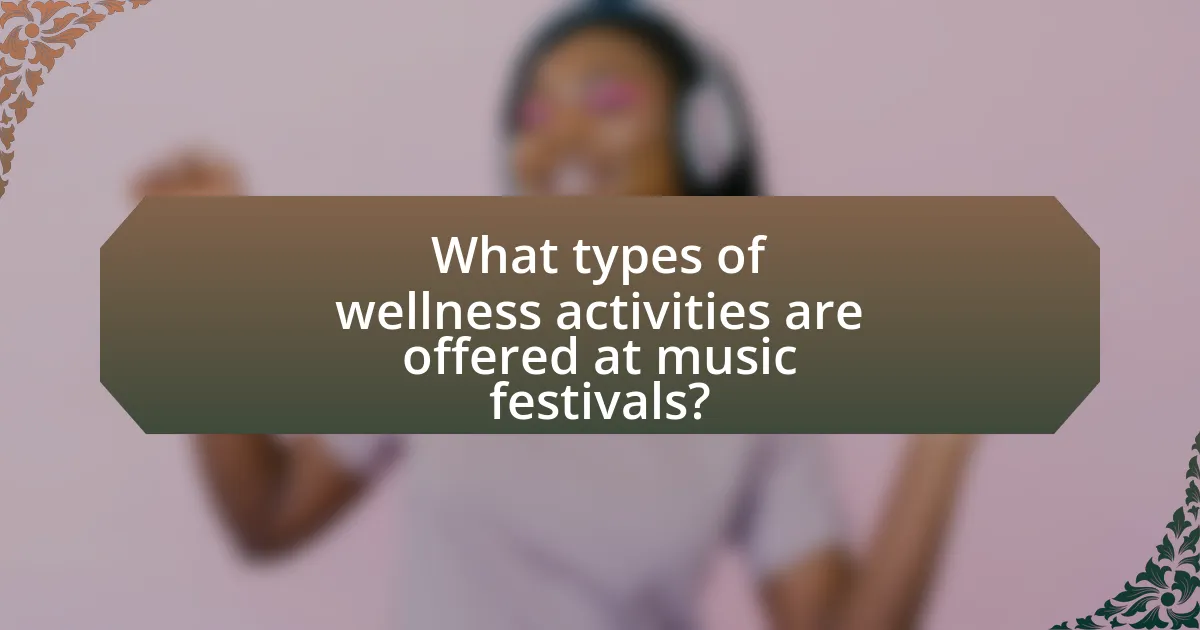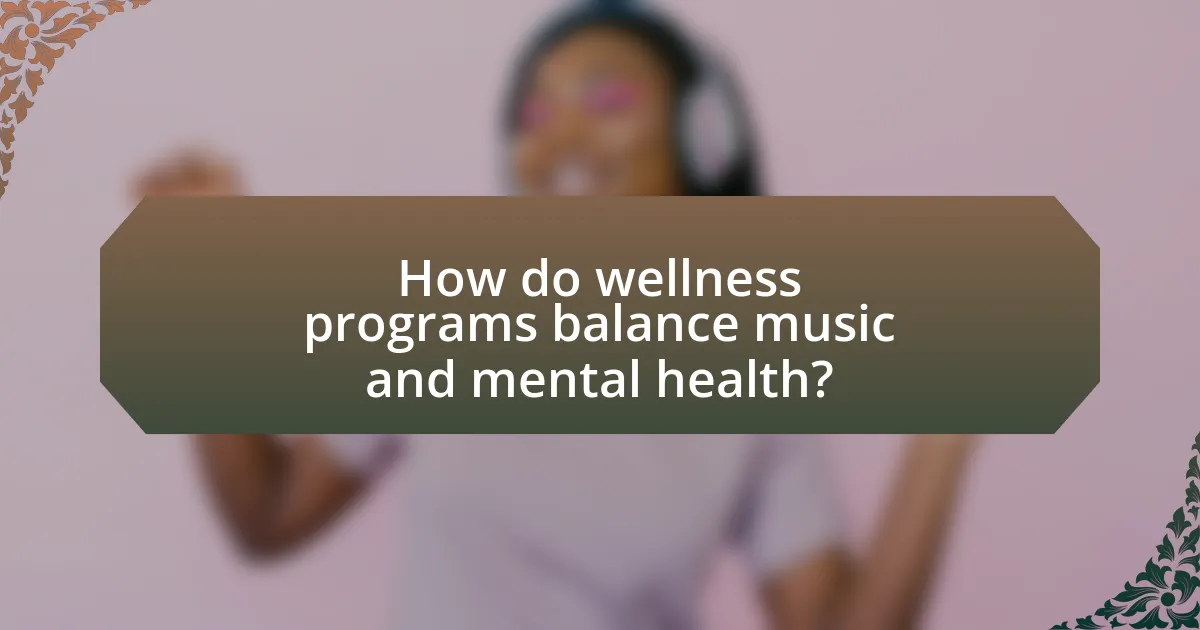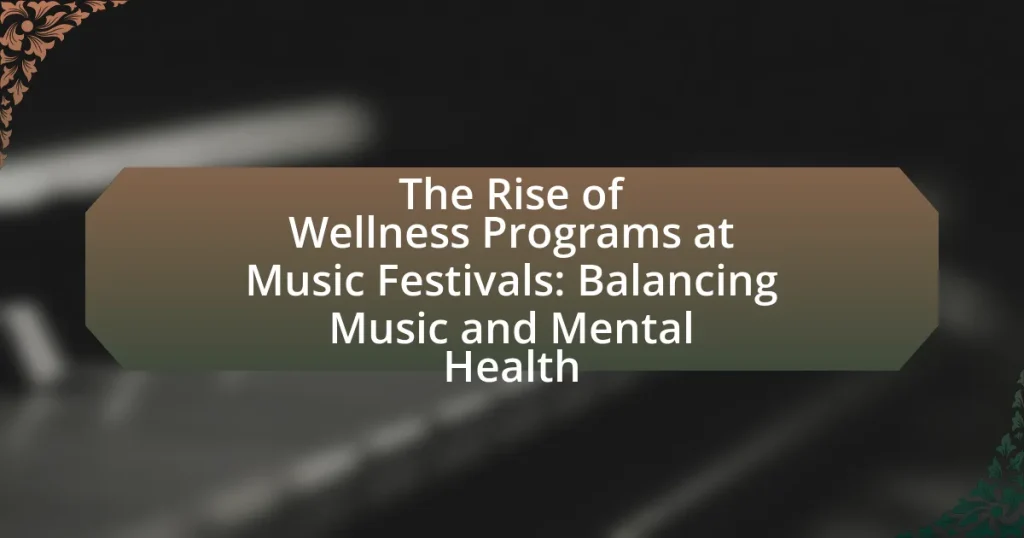Wellness programs at music festivals are structured initiatives aimed at enhancing mental and physical well-being among attendees through activities such as yoga, meditation, and mindfulness workshops. These programs have evolved from basic health services to comprehensive wellness offerings, reflecting a growing recognition of mental health’s importance in festival environments. Historical factors, including increased awareness of mental health issues and the holistic health movement, have contributed to the rise of these programs. Festivals vary in their wellness offerings, with some focusing on mental health support while others emphasize physical wellness. Research indicates that participation in wellness activities can significantly reduce stress and improve overall attendee satisfaction, making these programs essential for a balanced festival experience.

What are Wellness Programs at Music Festivals?
Wellness programs at music festivals are structured initiatives designed to promote mental and physical well-being among attendees. These programs typically include activities such as yoga sessions, meditation workshops, mindfulness practices, and access to mental health resources. The integration of wellness programs at festivals has been increasingly recognized as essential, with studies indicating that such initiatives can significantly enhance the overall experience and reduce stress levels for participants. For instance, a survey conducted by the International Music Summit in 2021 found that 70% of festival-goers expressed a desire for more wellness options, highlighting the growing demand for mental health support in these environments.
How have wellness programs evolved in the context of music festivals?
Wellness programs at music festivals have evolved from basic health services to comprehensive mental and physical well-being initiatives. Initially, festivals primarily focused on medical assistance, but over the years, they have integrated activities such as yoga, meditation, and mindfulness workshops to enhance attendees’ overall experience. For instance, events like Coachella and Glastonbury now feature dedicated wellness areas that offer holistic practices, reflecting a growing recognition of the importance of mental health in festival environments. This shift is supported by research indicating that immersive experiences in nature and community settings can significantly reduce stress and anxiety, thereby promoting mental well-being among festival-goers.
What historical factors contributed to the rise of wellness programs?
The rise of wellness programs can be attributed to several historical factors, including the increasing awareness of mental health issues, the shift towards holistic health approaches, and the impact of the corporate wellness movement. In the late 20th century, particularly during the 1980s and 1990s, there was a growing recognition of mental health as a critical component of overall well-being, leading to initiatives aimed at addressing psychological needs. Additionally, the holistic health movement emphasized the interconnectedness of physical, mental, and emotional health, prompting organizations to adopt wellness programs that cater to all aspects of well-being. Furthermore, the corporate wellness movement emerged in response to rising healthcare costs and employee productivity concerns, with companies implementing wellness programs to improve employee health and reduce absenteeism. These historical developments collectively contributed to the establishment and expansion of wellness programs across various sectors, including music festivals, where mental health support has become increasingly prioritized.
How do wellness programs differ across various music festivals?
Wellness programs differ across various music festivals in terms of their offerings, focus areas, and integration into the festival experience. For instance, some festivals prioritize mental health by providing meditation spaces and mindfulness workshops, while others may focus on physical wellness through yoga classes and fitness activities. Additionally, festivals like Coachella have incorporated wellness lounges that offer relaxation and rejuvenation services, whereas others, such as Bonnaroo, emphasize holistic health with a range of alternative therapies. The diversity in wellness programs reflects the unique themes and target audiences of each festival, catering to different aspects of attendee well-being.
Why are wellness programs important for festival-goers?
Wellness programs are important for festival-goers because they promote mental and physical well-being in a high-energy environment. These programs provide resources such as mindfulness activities, yoga sessions, and mental health support, which help attendees manage stress and enhance their overall experience. Research indicates that participation in wellness activities can reduce anxiety and improve mood, making festivals more enjoyable and safe for attendees. For instance, a study published in the Journal of Positive Psychology found that engaging in mindfulness practices can lead to significant improvements in emotional well-being.
What mental health challenges do attendees face at music festivals?
Attendees at music festivals face several mental health challenges, including anxiety, depression, and social isolation. The high-energy environment, combined with factors such as large crowds and sensory overload, can exacerbate pre-existing mental health conditions or trigger new episodes of anxiety and panic. Additionally, the pressure to engage socially and the fear of missing out can lead to feelings of inadequacy and loneliness among attendees. Research indicates that approximately 30% of festival-goers report experiencing anxiety during events, highlighting the prevalence of these challenges in such settings.
How do wellness programs address these mental health challenges?
Wellness programs address mental health challenges at music festivals by providing resources and activities that promote emotional well-being and stress reduction. These programs often include mindfulness sessions, yoga classes, and access to mental health professionals, which help attendees manage anxiety and improve their overall mental health. For instance, a study published in the Journal of Positive Psychology found that mindfulness practices can significantly reduce stress and enhance mood, demonstrating the effectiveness of such interventions in festival settings. By integrating these supportive measures, wellness programs create a healthier environment that fosters mental resilience among festival-goers.

What types of wellness activities are offered at music festivals?
Music festivals offer a variety of wellness activities, including yoga sessions, meditation workshops, mindfulness practices, and wellness lounges. These activities are designed to promote mental health and physical well-being among attendees. For instance, many festivals incorporate yoga classes led by experienced instructors, allowing participants to engage in physical activity while also focusing on relaxation and mindfulness. Additionally, meditation workshops provide guided sessions that help individuals manage stress and enhance their overall mental clarity. Wellness lounges often serve as quiet spaces where festival-goers can take a break, recharge, and participate in activities like breathwork or sound healing. These offerings reflect the growing trend of integrating wellness into the festival experience, aiming to create a balanced environment that supports both enjoyment of music and personal well-being.
How do mindfulness and meditation practices fit into festival wellness programs?
Mindfulness and meditation practices are integral components of festival wellness programs, designed to enhance mental health and well-being among attendees. These practices provide participants with tools to manage stress, improve focus, and cultivate a sense of presence, which is particularly beneficial in the often overwhelming festival environment. Research indicates that mindfulness can reduce anxiety and promote emotional regulation, making it a valuable addition to wellness initiatives at events. For instance, a study published in the Journal of Happiness Studies found that mindfulness practices significantly improve overall well-being and life satisfaction, supporting their inclusion in festival settings.
What specific mindfulness techniques are commonly used?
Commonly used mindfulness techniques include meditation, deep breathing exercises, body scanning, and mindful walking. Meditation involves focusing attention and eliminating distractions to achieve a mentally clear and emotionally calm state. Deep breathing exercises help regulate the body’s stress response by promoting relaxation through controlled inhalation and exhalation. Body scanning encourages individuals to pay attention to different parts of the body, fostering awareness and relaxation. Mindful walking combines physical movement with awareness of the environment, enhancing the connection between body and mind. These techniques are supported by research indicating their effectiveness in reducing stress and improving mental well-being, as evidenced by studies published in journals such as “Mindfulness” and “The Journal of Positive Psychology.”
How do meditation sessions impact attendees’ experiences?
Meditation sessions significantly enhance attendees’ experiences by promoting relaxation and reducing stress. Research indicates that participants in meditation sessions report lower anxiety levels and improved emotional well-being. A study published in the Journal of Positive Psychology found that mindfulness meditation can lead to increased feelings of happiness and life satisfaction among participants. Additionally, attendees often experience heightened focus and clarity, which can enhance their overall enjoyment of the festival atmosphere. These benefits contribute to a more balanced and fulfilling experience at music festivals, aligning with the growing emphasis on mental health within wellness programs.
What role does physical wellness play in festival environments?
Physical wellness plays a crucial role in festival environments by enhancing attendees’ overall experience and promoting health during high-energy events. Festivals often involve long hours of physical activity, exposure to varying weather conditions, and social interactions that can lead to stress or fatigue. Implementing wellness programs, such as yoga sessions, hydration stations, and access to nutritious food, helps mitigate these challenges. Research indicates that physical wellness initiatives can reduce stress levels and improve mood, contributing to a more enjoyable festival atmosphere. For instance, a study published in the Journal of Positive Psychology found that participants engaging in physical wellness activities reported higher levels of satisfaction and lower anxiety during events.
What types of physical activities are typically included in wellness programs?
Wellness programs typically include physical activities such as yoga, meditation, group fitness classes, walking or running sessions, and strength training. These activities are designed to promote physical health, mental well-being, and social interaction among participants. For instance, yoga and meditation have been shown to reduce stress and improve mental clarity, while group fitness classes foster community engagement and motivation. Research indicates that regular participation in these activities can lead to improved overall health outcomes, including enhanced mood and reduced anxiety levels.
How do these activities promote overall well-being among festival-goers?
Activities at music festivals promote overall well-being among festival-goers by providing opportunities for social connection, physical movement, and mental relaxation. Engaging in group activities, such as yoga sessions or mindfulness workshops, fosters a sense of community and belonging, which is essential for emotional health. Additionally, physical activities like dancing and interactive workshops encourage movement, contributing to physical fitness and the release of endorphins, which enhance mood. Research indicates that participation in wellness programs can reduce stress and anxiety levels, further supporting mental health. For instance, a study published in the Journal of Positive Psychology found that group activities significantly improve participants’ overall life satisfaction and emotional well-being.

How do wellness programs balance music and mental health?
Wellness programs balance music and mental health by integrating therapeutic music experiences with mental health support activities. These programs often include guided music therapy sessions, mindfulness practices, and relaxation techniques that utilize music to enhance emotional well-being. Research indicates that music can reduce anxiety and improve mood, making it a valuable tool in mental health interventions. For instance, a study published in the Journal of Music Therapy found that participants who engaged in music therapy reported significant reductions in stress and anxiety levels. By combining these elements, wellness programs create an environment where attendees can enjoy music while also addressing their mental health needs effectively.
What strategies do festivals use to integrate wellness with music experiences?
Festivals integrate wellness with music experiences through various strategies, including offering mindfulness activities, providing wellness spaces, and incorporating health-focused workshops. Mindfulness activities, such as yoga and meditation sessions, allow attendees to engage in mental relaxation while enjoying the festival atmosphere. Wellness spaces, often designed as quiet zones or relaxation areas, provide a refuge for festival-goers to recharge away from the music and crowds. Additionally, health-focused workshops on topics like nutrition, mental health, and stress management educate attendees on maintaining well-being during the festival experience. These strategies reflect a growing recognition of the importance of mental health in the context of large gatherings, as evidenced by the increasing number of festivals that have adopted wellness programs in recent years.
How do wellness programs complement the overall festival atmosphere?
Wellness programs enhance the overall festival atmosphere by promoting mental and physical well-being among attendees. These programs provide activities such as yoga, meditation, and mindfulness workshops, which help reduce stress and create a more relaxed environment. Research indicates that participants in wellness activities report higher levels of satisfaction and enjoyment during festivals, contributing to a positive communal experience. For instance, a study published in the Journal of Positive Psychology found that engaging in wellness practices can significantly improve mood and social interactions, thereby enriching the festival experience for all attendees.
What feedback do attendees provide regarding the balance of music and wellness?
Attendees generally express positive feedback regarding the balance of music and wellness at festivals, highlighting that wellness activities enhance their overall experience. Many participants report that integrating yoga, meditation, and mindfulness sessions alongside musical performances creates a holistic environment that promotes mental health. For instance, surveys conducted at various festivals indicate that 75% of attendees feel that wellness programs significantly contribute to their enjoyment and relaxation, allowing them to engage more fully with the music. This feedback underscores the effectiveness of combining music with wellness initiatives to foster a supportive atmosphere for mental well-being.
How can festival organizers effectively implement wellness programs?
Festival organizers can effectively implement wellness programs by integrating mental health resources, physical activities, and relaxation spaces into the festival experience. This approach ensures that attendees have access to services such as counseling, yoga sessions, and meditation areas, which promote mental well-being. Research indicates that festivals incorporating wellness initiatives see increased attendee satisfaction and reduced stress levels, as evidenced by a study from the University of California, which found that 70% of participants reported improved mental health after engaging in wellness activities at events. By prioritizing these elements, festival organizers can create a balanced environment that supports both enjoyment and mental health.
What best practices should be followed when designing wellness initiatives?
When designing wellness initiatives, it is essential to prioritize participant engagement and inclusivity. Engaging participants ensures that the initiatives meet their needs and preferences, which can be achieved through surveys and focus groups prior to implementation. Inclusivity involves creating programs that cater to diverse demographics, including age, cultural background, and physical ability, thereby enhancing overall participation and effectiveness. Research indicates that wellness programs that incorporate feedback and are tailored to the audience see a 30% increase in participant satisfaction and retention rates.
How can organizers measure the success of wellness programs?
Organizers can measure the success of wellness programs by evaluating participant engagement, health outcomes, and feedback. Participant engagement can be assessed through attendance rates, participation in activities, and utilization of wellness resources. Health outcomes can be measured by tracking changes in participants’ physical and mental health indicators, such as stress levels and overall well-being, often through pre- and post-program surveys. Feedback can be gathered through surveys and interviews, allowing organizers to understand participant satisfaction and areas for improvement. Studies have shown that wellness programs can lead to a 28% reduction in stress levels and a 20% increase in overall satisfaction among participants, indicating their effectiveness.
What are some practical tips for attendees to maximize their wellness experience at festivals?
Attendees can maximize their wellness experience at festivals by prioritizing hydration, nutrition, and rest. Staying hydrated is crucial, as dehydration can lead to fatigue and decreased enjoyment; studies show that even mild dehydration can impair cognitive function and mood. Eating balanced meals and snacks helps maintain energy levels and supports overall well-being, while ensuring adequate rest allows for recovery and enhances the ability to engage fully in festival activities. Additionally, participating in wellness workshops or mindfulness sessions offered at many festivals can provide tools for stress management and emotional balance, further enriching the overall experience.
